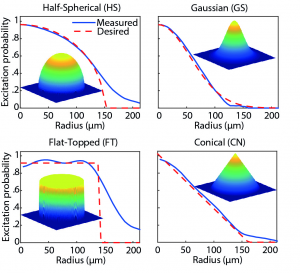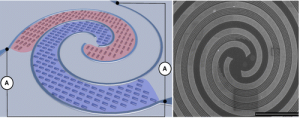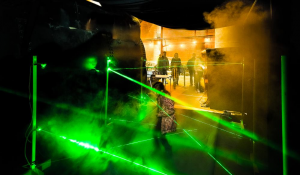Student Chapter update
PhD student Lukas Wesemann was elected the new President of the University of Melbourne OSA student chapter at the AGM on 8 May. Hamid Soleimaninejad (Chemistry) was elected President of the local SPIE chapter.
Atomic, Nanophotonic and Optical Physics
PhD student Lukas Wesemann was elected the new President of the University of Melbourne OSA student chapter at the AGM on 8 May. Hamid Soleimaninejad (Chemistry) was elected President of the local SPIE chapter.
Congratulations to Dene Murphy on completing requirements for his PhD! Dene used laser cooling of atoms to generate ultracold bunches of electrons and ions for nanoscale imaging. Through a combination of computer simulations and novel experiments his work enabled new insights into the charged particle interactions that limit the brightness of sources used in extreme electron and ion microscopy and nanofabrication.
Dene used laser cooling of atoms to generate ultracold bunches of electrons and ions for nanoscale imaging. Through a combination of computer simulations and novel experiments his work enabled new insights into the charged particle interactions that limit the brightness of sources used in extreme electron and ion microscopy and nanofabrication.
Stuart Earl (PhD) and Panji Achmari (MPhil) recently received confirmation of successfully completing their degrees. Their citations read:
Stuart … studied the interaction of light with metallic nanoparticles coupled to semiconductor films. He found that their optical properties could be switched by location on temperature-controllable materials, and their presence modified light emission by quantum dots. His studies will inform the development of new ultra-compact optical devices and light sources;
and
Panji … studied the interaction of focussed optical beams with nanostructured surfaces tailored to have specific electromagnetic properties. He has shown that it is possible to excite their elusive dark modes and subsequently investigated their sensitivity to different illumination strategies. His work will influence future optical sensors and imaging systems.
Congratulations and all the best for bright futures!
Professors Ann Roberts and Paul Mulvaney (Bio21 and Chemistry) have been awarded an Australian Linkage Project grant with collaborators from the Reserve Bank of Australia to develop anti-counterfeiting features for future Australian banknotes.
An article describing recent work by members of the Atom Optics sub- group into precise control of the shape of charged particle bunches has been published recently in Physical Review Letters.
group into precise control of the shape of charged particle bunches has been published recently in Physical Review Letters.
Rob Scholten and Keith Nugent (Latrobe University) have received $765,500 in funding in a ARC Discovery Project grant ‘Atomic scale imaging with high coherence ions and electrons’ commencing in 2017. This project aims to combine a cold atom electron-ion source with a commercial microscope column for atomic-scale imaging in biosciences and materials science. Nanoscale imaging with electron and ion microscopy are tools for investigating the world at the atomic scale, underpinning development in modern technologies from semiconductor devices to medical treatments. This project will use ideas from laser cooling of atoms and atom optics to achieve new imaging modalities for time-lapse imaging of fundamental processes at the nano-scale. It will allow increasingly small scale resolution of fundamental processes at the nano-scale.
Professor Chantler has been recognised for advances in the accurate measurement and understanding of photons and matter interaction in the X-ray regime. Congratulations, Chris!
Work led by Eugene Panchenko and Jasper Cadusch describing a novel polarisation-sensitive, nanoantenn a-enabled Metal-Semiconductor-Metal photodetector was published in ACS Photonics on 9 September 2016. This device demonstrates the capacity for plasmonics to contribute to new, ultracompact optical communication, sensing and imaging systems. A link to the article is here.
a-enabled Metal-Semiconductor-Metal photodetector was published in ACS Photonics on 9 September 2016. This device demonstrates the capacity for plasmonics to contribute to new, ultracompact optical communication, sensing and imaging systems. A link to the article is here.

Members of the Optics Group and other members of the University’s OSA and SPIE Student Chapters attracted enormous attention with their display at Astrolight 2016 at Scienceworks on 10 September. PhD student Rory Speirs and new MSc student Gijs van Pamelen set up the hugely popular laser maze. Lili Sun from the Astrophysics group presented exciting graphics describing gravitational waves and Rory also set up a Michelson interferometer to show how they are detected. Other participants were Daniel Kelly, Tom Fabig and Mohammed Jameel from the School of Chemistry, Chris Billington and Ana Fabela Hinojosa from Monash University and Sara Amos from Williamstown High School. Thanks also to Ben Sparkes for assisting with preparing the demonstrations. More information and photos on the Scienceworks Facebook Page.
Applications are now being sought for a post-doctoral fellow in Nanophotonics. Details here. Note that applications close 31 July 2016. Contact Ann Roberts for more information.
Number of posts found: 85